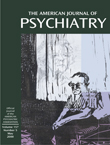In DSM-IV, generalized anxiety disorder is characterized by the essential features of excessive anxiety and worry that an individual finds difficult to control. This cognitive symptom of worry must be about multiple events or activities that are not confined to the features of another axis I disorder. In addition, three or more associated symptom criteria must be present, with at least some of them present more days than not for the past 6 months. The associated symptom criteria fall into two categories, each of which contains three symptoms: 1) motor tension—muscle tension, restlessness, and fatigue and 2) hypervigilance—irritability, difficulty falling asleep, and difficulty concentrating.
Generalized anxiety disorder is difficult to distinguish from other mood and anxiety disorders, with which it shares many symptoms, and it is highly comorbid
(1). To help differentiate generalized anxiety disorder from mood disorders, DSM-IV stipulates that the diagnosis of generalized anxiety disorder cannot be assigned if its features occur exclusively during a mood disorder. In their article on the empirical basis of generalized anxiety disorder, Brown et al.
(2) cited research examining the ability of the item “Do you worry excessively about minor matters?” from the Anxiety Disorders Interview Schedule—Revised
(3) to discriminate patients with generalized anxiety disorder from patients with other anxiety disorders. They found that unpublished 1991 research by DiNardo (which is supported by unpublished 1993 research by Borkovec) demonstrates that the positive predictive power of the question is 0.36 (the probability of a generalized anxiety disorder diagnosis, given an affirmative response) and the negative predictive power is 0.94 (the probability of not having a generalized anxiety disorder diagnosis, given a negative response). These findings indicate that, although an affirmative response to the question about excessive worry over minor matters cannot confirm a diagnosis of generalized anxiety disorder, a negative response can rule out generalized anxiety disorder with confidence
(2, p. 1277).
To help physicians screen for generalized anxiety disorder, I developed the following mnemonic device: “Does Mr. Fisc worry excessively about minor matters?” Initially, one simply substitutes “you” for “Mr. Fisc” in the mnemonic device and asks, “Do you worry excessively about minor matters?” If endorsed by the patient, one uses the remainder of the mnemonic “Mr. Fisc” to determine if three or more of the associated motor tension and hypervigilance criteria are present. Each letter of “Mr. Fisc” stands for one of the associated symptoms, as follows: M=muscle tension, R=restlessness, F=fatigue, I=irritability, S=sleep (difficulty falling asleep), C=concentration (difficulty concentrating). I hope others find this to be a user-friendly tool that facilitates improved recognition of this disorder.

